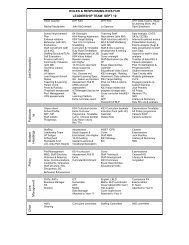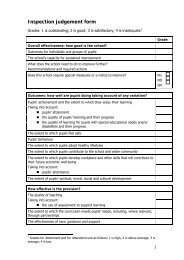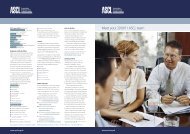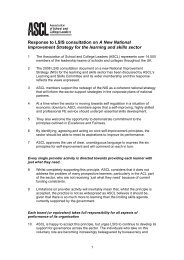Ella McSorley, Four Dwellings High School
Ella McSorley, Four Dwellings High School
Ella McSorley, Four Dwellings High School
You also want an ePaper? Increase the reach of your titles
YUMPU automatically turns print PDFs into web optimized ePapers that Google loves.
<strong>Four</strong> <strong>Dwellings</strong> <strong>High</strong> <strong>School</strong><br />
Curriculum Reform
Our Local Context:<br />
• Mixed comprehensive:<br />
(725 on role) without 6th form<br />
• Most learners (about 70%) come<br />
from the most deprived areas of<br />
the city<br />
• 60% fsm<br />
• 32% A*-C (20% Eng and Maths)<br />
• Current Y8 - 65% substantially<br />
below chronological reading age<br />
• <strong>High</strong> number of fixed<br />
term/permanent exclusions
More specifically:<br />
Many learners lack clear aspirations<br />
and direction. Many have poor functional skills<br />
and under-developed social and emotional<br />
skills. Many come from families who are<br />
mistrustful of school<br />
and education, and<br />
similarly lack in the<br />
core skills.
Our Core Aims in Curriculum<br />
Reform:<br />
To tackle the issues which were preventing<br />
access to the curriculum<br />
To encourage and develop pupil motivation<br />
and enjoyment<br />
To impact on attainment and progress<br />
To create a sustainable and collaborative<br />
approach to curriculum innovation
National Context: The Big Picture<br />
National Curriculum now:<br />
• joined together; cohesive<br />
• based on core aims focused on learner<br />
• framed by three key questions<br />
• available on a comprehensive website…<br />
so that teachers, schools, parents, learners<br />
and interested stakeholders can see the entire<br />
educational experience a learner may<br />
experience
The Big Picture
Core Aims:<br />
‘to create a world class curriculum’ to develop:<br />
Successful Learners who make progress and achieve<br />
Confident Individuals who lead safe and healthy lives<br />
Responsible Citizens who make a positive contribution to<br />
society
How is it different?<br />
• much more flexible: we can create our own local picture -<br />
to allow for a truly personalised curriculum<br />
• ECM and the five outcomes permeate document<br />
• subjects not seen separately but part of a whole<br />
educational experience<br />
• focus on processes and skills development rather than<br />
simply subject content
<strong>Four</strong> <strong>Dwellings</strong>’ Curriculum Reform:<br />
It’s small steps slowly…
Focus on:<br />
Y7<br />
Transition<br />
Skills’ development and acquisition<br />
Collaboration<br />
Creativity
Key Question 1:<br />
What are we trying to achieve?
Focus on Learner from outset:<br />
What do we want our learners to be/to<br />
become by the end of key stage 3? Key stage<br />
4? What are our learners like now?<br />
This focused us on the learning and allowed to<br />
consider skills/processes as opposed to a focus<br />
on the teacher and subject. For us it was clear:<br />
a focus on skills; functional and personal,<br />
learning and thinking was necessary.
Not that surprising:<br />
The list of qualities from both learners and<br />
teachers, not dissimilar to the list employers<br />
also looking for: in addition to functional core<br />
skills, teacher and learners were looking for pupils<br />
who could:<br />
• use their initiative<br />
• articulate their thoughts<br />
• work as part of a team<br />
• think creatively, problem solve<br />
• contribute to the school positively<br />
• manage and organise themselves
PLT Skills<br />
The teaching of social skills and PLT skills<br />
needed to be made explicit: it always was<br />
there, but…<br />
Cohesive?<br />
Planned out?<br />
Monitored and assessed?<br />
Progress tracked?
PLT Chart
Common Language<br />
We also knew it was necessary to give<br />
our students a language for talking about<br />
their learning and progress; under-developed<br />
vocabulary and poor literacy skills were<br />
hampering work<br />
and progress.
Key Question 2:<br />
How do we organise the learning?
The Basics:<br />
Y7 pupils have one day per fortnight where<br />
they are timetabled with their skills teacher<br />
(one of the core writing team members) for an<br />
entire day.<br />
During this day they develop their functional<br />
and PLT skills through activities as diverse as<br />
making a radio broadcast, or planning a school<br />
trip for the year group.
Structure:<br />
• Only Y7 in pilot phase<br />
• Transition carefully planned and<br />
delivered<br />
• All subjects involved in delivery of skills<br />
• Monthly PLT focus, termly functional skills<br />
focus<br />
• One day per fortnight where skills explicitly<br />
delivered<br />
• Followed up with assemblies, tutor time,<br />
plasma screen, website, posters around<br />
school<br />
• All teachers refer to skills in LO across<br />
curriculum
Skills Days<br />
Transition: about building on primary<br />
experience, developing understanding of skills,<br />
getting to know teacher, one another and<br />
school, team and tutor group building via<br />
outward bound<br />
September: Reflective Learning - essential<br />
to begin with this to consider how, why we<br />
learn and to think of ways of improving<br />
learning. How to Thrive and Survive at <strong>Four</strong><br />
<strong>Dwellings</strong> <strong>High</strong> <strong>School</strong> - boardgame
Skills Days<br />
October: Team Work<br />
• Radio News Broadcast<br />
• Desert Island Survival<br />
November: Independent Enquiry<br />
• Murder Mystery - ‘The Identification’<br />
• Educational Trip Bid Presentation
Skills Days<br />
December: Creative Thinking<br />
Homelessness<br />
January: Effective Participation<br />
•Values<br />
• Designing and setting up a charity
Benefits of skills days<br />
• Not tied to time constraints: activities are<br />
given the time needed<br />
• Consistency - same teacher delivering all 5<br />
lessons<br />
• Tangible outcomes to each day<br />
• Emphasis on ENJOY and achieve<br />
• Development and progress of skills apparent<br />
through length of time teacher spends with<br />
class
The Process<br />
• Whole staff consultation/Pupil Consultation<br />
• Staff training day: led by learners, ‘blue-sky’ thinking, crosscurricular<br />
writing teams began here<br />
• Volunteers for new curriculum writing team<br />
• Learning and Teaching group decide on logistics and<br />
structure<br />
• Pupil writing teams<br />
• Case study school for QCA<br />
• Develop materials and present to SMT<br />
• Materials trialled with Y7<br />
• Pupils and teachers at launch of National Curriculum<br />
• Skills curriculum began in September and first term<br />
evaluated in December<br />
• Spring term skills days planned by cross-curricular groups
Impact: Key Question 3:<br />
How well are we achieving our aims?
Two main strands to this:<br />
For staff:<br />
• Focus on entire educational experience<br />
• Re-engagement in discussions about Learning and<br />
Teaching<br />
• Shift away from focus on content, syllabus and<br />
subject to the learners, skills and processes (link to<br />
new NC)<br />
• Shift away from dealing with behaviour to teaching<br />
how to behave<br />
• Greater autonomy, creativity<br />
• CPD - collaborative planning, writing and delivery<br />
• More cohesive curriculum: mapped out and shared
Views of The Writing Team<br />
“Many of our pupils struggle to adapt to the<br />
changes and challenges of secondary school. Many<br />
problems stem from pupils' lack of confidence, underdeveloped<br />
basic literacy and numeracy skills, poor<br />
interpersonal skills and a lack of 'team spirit'.<br />
The skills-based curriculum aims to tackle these. One day<br />
per fortnight will be a 'skills' day. The aim is to emphasise<br />
the centrality of these skills and help build each pupil's bank<br />
of skills in order to make each one a better learner. If we<br />
invest this time in Year 7, we believe that the pace and<br />
quality of learning will increase”.<br />
Martin Phillips, History
Views of The Writing Team<br />
“The new curriculum has given me the flexibility to try different<br />
approaches and take on different subjects and strategies<br />
within my lessons which personally excites and stimulates me.<br />
I feel, as writers of the new curriculum, we have dedicated a<br />
lot of our time and taken our role very seriously. Frankly I feel<br />
this enthusiasm will be conveyed to our new learners, thus<br />
increasing their enjoyment.”<br />
Dominic Barnard, ICT
Views of The Writing Team<br />
“ The real reason I joined the team was to make a<br />
difference I think. I wanted to be part of this exciting project<br />
which would encourage independent and creative<br />
thinkers. I have found more and more that pupils want<br />
everything clarifying, they want every idea given to them<br />
instead of just giving something a go and thinking for<br />
themselves. This new curriculum actually gets them to<br />
do this”.<br />
Kerrie Turley, English
Views of The Writing Team<br />
“I think that the new curriculum will facilitate<br />
the cross curricular links that already exist but are not<br />
emphasised, and help the teaching of key skills by reinforcing<br />
them in a range of subject areas!”<br />
Mike Bennet, Geography<br />
“One of my greatest pleasures in teaching in those early days<br />
lay in the process of working with colleagues to plan a<br />
curriculum that would interest, motivate, enthuse and above<br />
all educate the specific group of pupils for whom it was<br />
intended”<br />
Les Stringer, English
Views of the writing team<br />
‘The needs and potential of individual learners have<br />
always been at the centre of everything that we do at <strong>Four</strong><br />
<strong>Dwellings</strong>’<br />
James Hyde, English<br />
‘I think that writing our own curriculum empowers the<br />
teachers, and will ultimately empower the learners, by<br />
giving them the kind of skills they need to succeed in life.’<br />
Ela <strong>McSorley</strong>, English
Impact for Learners:<br />
1) Involvement in writing and editing materials<br />
gives greater awareness of learning process<br />
1) Students engaged, interested and motivated<br />
2) Trial a success; key factors in this - giving greater<br />
responsibility to learner, allowing time for<br />
development of skills, building in reflection time<br />
each step of the way, focus on process, not<br />
necessarily end result, although each day does<br />
end with tangible outcome<br />
3) Students beginning to appreciate links and<br />
connections across the subjects
Skills Day Trials<br />
Student Evaluations:<br />
‘I was very proud of the fact I co-operated with other<br />
people’<br />
‘I was proud of how much I put my hand up’<br />
the day was….’perfect and fun and we were learning<br />
all the time’<br />
‘Which skills did I use? My brain skills’!!!
Impact: first tangible results<br />
Behaviour: CMIS entries for behavioural<br />
referrals are down; behaviour as a whole<br />
reported by HoY and tutors is improved and<br />
improving<br />
Attendance: is up on the skills days: average<br />
attendance of 95% for skills days, average<br />
attendance of 94% for all other days for Y7
Impact: Attendance<br />
Attendance Sept - Dec<br />
95%<br />
94%<br />
93%<br />
Percentage<br />
92%<br />
91%<br />
90%<br />
89%<br />
88%<br />
87%<br />
Y7 (all) Y7 (skills) Y8 (all) Y9 (all) Y10 (all) Y11 (all)<br />
Year gro
What are we learning?<br />
• It’s a challenge - we are looking at the<br />
skills which need developing!<br />
• much overlap - hard (and not productive) to<br />
isolate skills<br />
• Functional Skills need to be carefully<br />
mapped out (current Y7 cohort first to need<br />
Level 2 in functional skills before they can sit<br />
GCSE in Eng, Maths and ICT)<br />
• need to involve everyone so there is shared<br />
ownership/cohesion
The next steps<br />
• Departments have developed ideas for skills<br />
days following Christmas (writing<br />
team drafted into skills days)<br />
• Map out functional skills<br />
• Involve Y11 more<br />
• Team teach to widen<br />
teaching expertise<br />
• Review progress of groups<br />
and individuals<br />
• Involve rest of KS3? (half<br />
days with Y8)
Viewing the Skills through the Website:
Using Case Studies from the Website:
How will we know we’ve succeeded?<br />
In the short-term:<br />
a) Y7 pupils will be able to work in groups, will<br />
begin to work independently, show selfreliance<br />
and will be able to co-operate and<br />
support their peers<br />
b) Pupils begin to develop their evaluative<br />
skills in lessons and over longer periods<br />
c) Pupils start to adapt the language of skills<br />
(PLT and functional) in their learning<br />
d) Behaviour and attendance improve
Why do it?<br />
A curriculum constructed with learners at its<br />
heart, by teachers and learners, we feel is<br />
having a much greater impact than the former<br />
curriculum, which felt ‘distanced’ and at times<br />
inaccessible.








